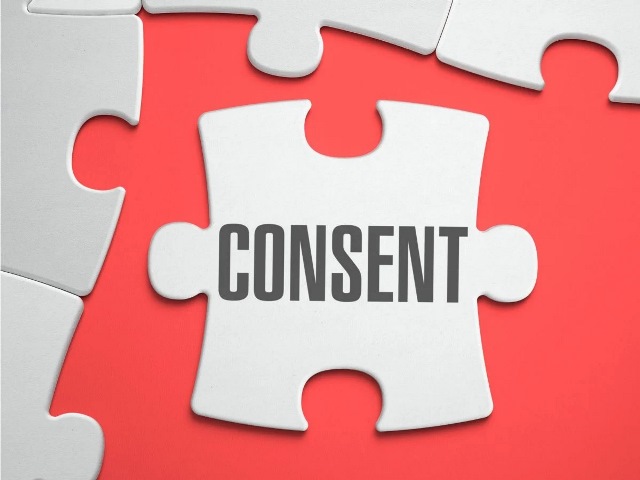Consent is an absolute must in sexual relationships. Picture this: you’re on a date, things are going well, and you feel a strong connection with your partner. As the night progresses, things become more intimate, and you both engage in sexual activity.
But did you ask for and receive consent every step of the way?
If not, you may have unknowingly crossed a line and violated your partner’s boundaries. Consent is a courteous trait and even more important in sexual relationships.
It’s time we start prioritizing the importance of consent in sexual relationships and understanding its role in creating healthy and safe intimacy.

Understanding Consent in Sexual Relationships
Consent is an enthusiastic and ongoing agreement to engage in sexual activity with a clear understanding of what is being requested and with the ability to choose to participate freely. Despite its importance, consent is often misunderstood, leading to miscommunications and potential harm.
Below are the various aspects of understanding consent:
Types of Consent in Sexual Relationships
There are different types of consent that individuals can give showing a willingness to participate in sexual intercourse. Here are some types of consent to look out for in sexual relationships:
Innovative Tech Solutions, Tailored for You
Our leading tech firm crafts custom software, web & mobile apps, designed with your unique needs in mind. Elevate your business with cutting-edge solutions no one else can offer.
Start Now- Verbal Consent: This involves explicitly confirming that you are willing to engage in sexual activity. It can be as simple as saying “Yes” or “I want to.”
- Non-Verbal Consent: There are nonverbal ways to express a clear desire to participate in sexual contact. This involves giving consent through body language, such as nodding, initiating physical contact, giving a thumbs up, actively touching your partner, and pulling your partner closer.
- Implied Consent: This type of consent assumes that consent has been given based on the circumstances or context of the situation. For example, if two people have been flirting and making out for a while, it may be assumed that they have consented to take things further.
- Withdrawn Consent: Consent can be withdrawn at any time, even if it was previously given. It is important to always respect an individual’s right to withdraw their consent.
Misconceptions About Consent

There are several common myths about consent that can be harmful. One such misconception is that silence or lack of resistance implies consent. However, just because someone is not actively saying “no” or physically resisting does not mean they have consented.
Another misconception is that someone can consent while under the influence of drugs or alcohol. This is wrong. If someone is intoxicated or unable to fully comprehend the situation, they cannot consent to sexual relationships or activity.
In addition, some people also believe marriage automatically guarantees consent. This is false. Forcefully having sexual intercourse with your spouse is called marital rape – a crime in many countries. Even in marriage, you must seek consent before engaging in sexual activity.
Finally, it is important to recognize that consent must be given freely and without coercion. Pressuring or manipulating someone into giving their consent is not true consent.
Examples of Situations where Consent may be Unclear
Consent can be especially unclear in certain situations, such as:
- When there is a power dynamic between the individuals, such as between a boss and an employee or a teacher and a student.
- If there is a language or cultural barrier that may affect the understanding of the situation.
- When the individuals have not established clear boundaries or expectations beforehand.
In these situations, it is important to communicate clearly and ask for explicit consent.

How to Implement Consent in Sexual Relationships
Implementing consent involves clear communication and respect for boundaries. Here are some tips on how to implement consent:
Seamless API Connectivity for Next-Level Integration
Unlock limitless possibilities by connecting your systems with a custom API built to perform flawlessly. Stand apart with our solutions that others simply can’t offer.
Get Started- Always ask for consent before engaging in any sexual activity. This also includes kissing. You must be prepared to respect a “no” or withdrawn consent.
- Listen to verbal and non-verbal cues that indicate discomfort or hesitation.
- Establish clear boundaries and expectations beforehand, and be willing to adjust if necessary.
- Recognize that consent is an ongoing process, and check in with your partner regularly.
- Understand that everyone has the right to their own body and their own choices.
Why Consent is Crucial
Consent is paramount for many reasons. Below we highlight why individuals must always seek consent in sexual relationships.
Protection Against Sexual Assault and Abuse
One of the primary reasons why consent is crucial is that it protects against sexual assault and abuse. Sexual assault is any unwanted sexual contact or behavior, and it can have devastating effects on survivors.
Consent ensures that all parties involved are willing and able to engage in sexual activity, which helps to prevent non-consensual or coerced encounters.
Promotes Healthy and Respectful Relationships
Consent is also crucial for promoting healthy and respectful relationships. By prioritizing open communication and mutual respect, individuals can establish clear boundaries and expectations that can help build trust and intimacy.
Read: 15 Signs You Are in a Healthy Relationship
Respect for each other’s choices and bodily autonomy also helps to create a safe and supportive environment for exploring sexual desires and preferences.
Empowers Individuals to Make their Own Choices
Consent is empowering because it puts individuals in control of their bodies and sexual experiences. By asking for and giving consent, individuals can assert their right to choose what they do and do not want to engage sexually.
This empowerment can extend beyond the bedroom and into all areas of life, helping individuals to develop a stronger sense of self-worth and agency.

Transform Business with Custom CRM & ERP Solutions
Elevate your operations with a CRM or ERP tailored for you. Let’s build the perfect solution that others can't replicate—crafted to match your business's needs like no other.
Get StartedLegal Implications of Consent
Consent also has significant legal implications. In many jurisdictions, sexual activity without consent is considered sexual assault or rape. This can result in criminal charges and severe legal consequences.
Consent and Sexual Education
Many people didn’t grow up understanding the importance of consent. This could be due to their background, environment, or media influence. It is, therefore, critical to teach consent in sexual education classes.
Here’s how schools and even parents can teach kids about consent in sexual education classes:
Defining Consent
One of the first steps in incorporating consent into sexual education is to define what it means. This means that individuals have the right to say “no” to any sexual activity at any time.
It also means sexual activity must stop immediately if someone withdraws their consent. By defining consent in clear and simple terms, sexual education can help individuals better understand their rights and boundaries.
Teaching Communication Skills
Consent is impossible without clear communication, so sexual education should include lessons on communicating effectively about sex and sexuality. This can include teaching individuals how to express their desires and boundaries, ask for and give consent, and negotiate with partners.
By teaching communication skills, sexual education can empower individuals to advocate for themselves and their partners and to establish healthy and respectful sexual relationships.
Addressing Consent Myths and Misconceptions
There are many myths and misconceptions surrounding consent, making it difficult for individuals to understand what it is and how it works.
For example, some people believe that silence or non-resistance equals consent. Others believe that consent can be implied based on previous sexual encounters.
Sexual education should address these myths and misconceptions head-on and provide clear and accurate information about what consent is and what it is not.

Tailored Tech Solutions to Drive Your Business Forward
Maximize your business potential with custom tech strategies. We deliver bespoke solutions that others can’t match, designed to solve your specific challenges with precision and impact.
Contact UsEmphasizing Consent in All Relationships
Finally, sexual education should emphasize the importance of consent in all types of relationships, not just romantic or sexual ones. This includes teaching individuals about consent in friendships, professional settings, and other social contexts.
Emphasizing consent as a universal principle can help create a culture that values and prioritizes respect, communication, and consent.
Advocating for Consent in Sexual Relationships
Prioritizing Consent in Personal Relationships
One of the most critical ways to prioritize and advocate for consent is to prioritize it in your personal relationships.
This means asking for and giving enthusiastic and ongoing consent for all sexual activity, respecting your partner’s boundaries and choices, and communicating openly and honestly about your desires and needs.
Consent should also apply to platonic relationships. Ask permission before you use a friend or family member’s property.
By prioritizing consent in your personal relationships, you can create a safe and supportive environment for building trust or exploring your sexuality.
Supporting Consent in Your Community
Another way to advocate for consent is to support it in your community. This can involve speaking out against sexual violence and harassment, attending and organizing consent-based events and workshops, and promoting consent education and resources.
Supporting consent in your community can help create a culture that values and prioritizes respect, communication, and consent.
Holding Institutions Accountable
In addition to personal and community actions, it is important to hold institutions accountable for promoting and enforcing consent.
This includes advocating for consent education and resources in schools, workplaces, and healthcare settings and pushing for policies and laws that protect individuals from sexual violence and harassment.
The media can sometimes be guilty of publishing violent sexual content. It’s important to limit these contents as they may shape the mentality of children.
By holding institutions accountable for consent, we can create a more just and equitable society for everyone.
Ultimatey, consent is not just a buzzword but an essential component of healthy and respectful sexual relationships. Seeking consent is not just a one-time event but an ongoing conversation that must be had with every sexual encounter.
By prioritizing consent in our personal relationships, supporting it in our communities, and holding institutions accountable for promoting and enforcing it, we can create a world where consent is valued and respected.
Remember, consent is sexy, and it is up to all of us to make it a priority in every sexual encounter. So let’s empower ourselves and others by promoting consent education and resources and making it a part of our daily lives. We can create a culture that values and prioritizes respect, communication, and consent in all sexual relationships.
Before you go…
Hey, thank you for reading this blog to the end. I hope it was helpful. Let me tell you a little bit about Nicholas Idoko Technologies. We help businesses and companies build an online presence by developing web, mobile, desktop, and blockchain applications.
We also help aspiring software developers and programmers learn the skills they need to have a successful career. Take your first step to becoming a programming boss by joining our Learn To Code academy today!









